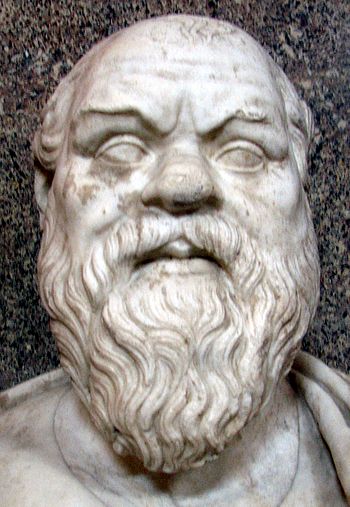 |
| (Photo credit: Wikipedia) |
Labels
Chinese culture
(16)
art
(18)
book reviews
(34)
child abuse
(10)
culture comparison
(10)
ethics
(11)
go game
(2)
history
(19)
life
(76)
love
(12)
movie reviews
(20)
my aphorisms
(97)
philosophy/reason
(13)
quotes
(42)
random thoughts
(146)
religion
(17)
suicide
(3)
Showing posts with label ignorance. Show all posts
Showing posts with label ignorance. Show all posts
March 14, 2016
Ignorance
Labels:
ignorance,
my aphorisms
November 6, 2015
From Ignorance To Stupidity
 |
| English: Bust of Socrates in the Vatican Museum (Photo credit: Wikipedia) |
Labels:
ignorance,
my aphorism,
philosophy,
socrates,
stupidity,
wise
August 22, 2015
Ignorance And Wisdom
| (Photo credit: Wikipedia) |
Labels:
acceptance,
ignorance,
my aphorisms,
old,
stupidity,
wisdom
August 3, 2015
Intellectual Progress
 |
| (Photo credit: Wikipedia) |
Labels:
ignorance,
intellectual progress,
my aphorisms,
stupidity
June 16, 2009
Know and needs to know
This passage of GRE reading practice enlightened my day. I have same thought about knowledge of mankind, but never put into such lucid description:
For me (anonymous author), scientific knowledge is divided into mathematical sciences, natural sciences or sciences dealing with the natural world (physical and biological sciences), and sciences dealing with mankind (psychology, sociology, all the sciences of cultureal achievements, every kind of historical knowledge). Apart from these sciences is philosophy, about which we will talk shortly. In the first place, all this is pure or theoretical knowledge, sought only for the purpose of understanding, in order to fulfill the need to understand that is intrinsic and consubstantial to man. What distinguishes man from animal is that he knows and needs to know. If man did not know that the world existed, and that the world was of a certain kind, that he was in the world and that he himself was of a certain kind, he wouldn't be man. The technical aspects of applications of knowledge are equally necessary for man and are of the greatest importance, because they also contribute to defining him as man and permit him to pursue a life increasingly more truly human.
But even while enjoying the results of technical progress, he must defend the primacy and autonomy of pure knowledge. Knowledge sought directly from its practical applications will have immediate and foreseeable success, but not the kind of important result whose revolutionary scope is in large part unforeseen, except by the imagination of the Utopians. Let me recall a well-known example. If the Greek mathematicians had not applied themselves to the investigation of conic sections, zealously and without the least suspicion that it might someday be useful, it would not have been possible centruries later to navigate far from shore. The first men to study the nature of electricity could not imagine that their experiements, carried on because of mere intellectural technology, would eventually lead to modern electrical technology, without which we can scarcely conceive of contemporary life. Pure knowledge is valuable for its own sake, because of the human spirit cannot resign itself to ignorance. But, in addition, it is the foundation for practical results that would not have been reached if this knowledge had not been sought disinterestedly.
For me (anonymous author), scientific knowledge is divided into mathematical sciences, natural sciences or sciences dealing with the natural world (physical and biological sciences), and sciences dealing with mankind (psychology, sociology, all the sciences of cultureal achievements, every kind of historical knowledge). Apart from these sciences is philosophy, about which we will talk shortly. In the first place, all this is pure or theoretical knowledge, sought only for the purpose of understanding, in order to fulfill the need to understand that is intrinsic and consubstantial to man. What distinguishes man from animal is that he knows and needs to know. If man did not know that the world existed, and that the world was of a certain kind, that he was in the world and that he himself was of a certain kind, he wouldn't be man. The technical aspects of applications of knowledge are equally necessary for man and are of the greatest importance, because they also contribute to defining him as man and permit him to pursue a life increasingly more truly human.
But even while enjoying the results of technical progress, he must defend the primacy and autonomy of pure knowledge. Knowledge sought directly from its practical applications will have immediate and foreseeable success, but not the kind of important result whose revolutionary scope is in large part unforeseen, except by the imagination of the Utopians. Let me recall a well-known example. If the Greek mathematicians had not applied themselves to the investigation of conic sections, zealously and without the least suspicion that it might someday be useful, it would not have been possible centruries later to navigate far from shore. The first men to study the nature of electricity could not imagine that their experiements, carried on because of mere intellectural technology, would eventually lead to modern electrical technology, without which we can scarcely conceive of contemporary life. Pure knowledge is valuable for its own sake, because of the human spirit cannot resign itself to ignorance. But, in addition, it is the foundation for practical results that would not have been reached if this knowledge had not been sought disinterestedly.
Subscribe to:
Posts (Atom)
